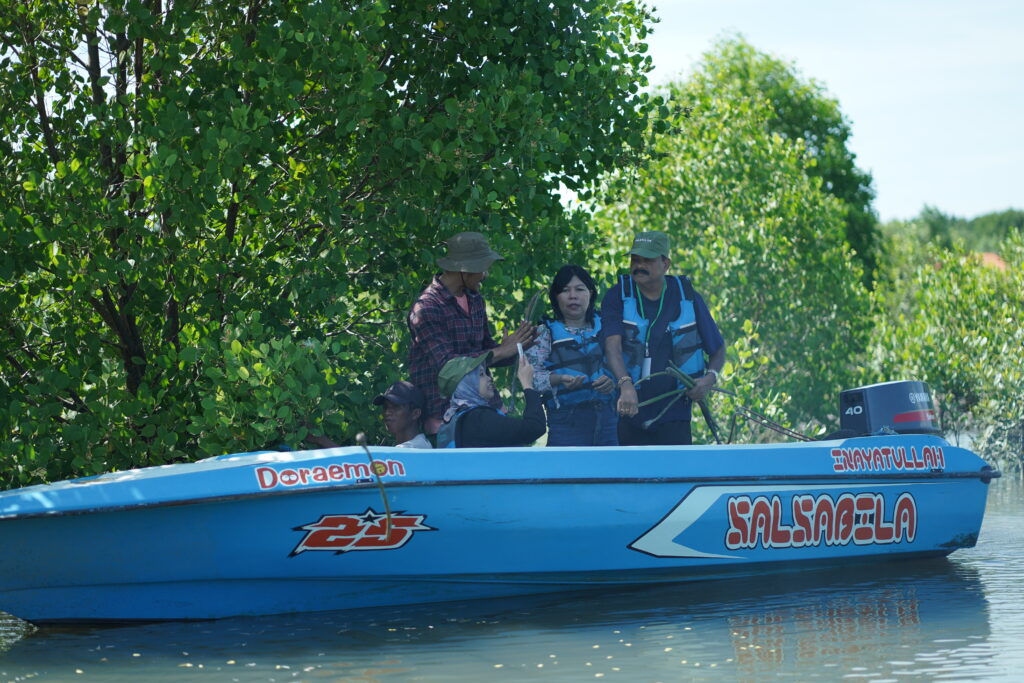
PRESS RELEASE : Sri Lanka Learns from Indonesia’s Successful Ecological Mangrove Rehabilitation
Bulungan, Indonesia, August 28, 2025 – A total of 25 members of the Sri Lankan government delegation, consisting of national and provincial officials, visited Liagu Village in Bulungan Regency, North Kalimantan Province. This activity was part of a learning exchange on mangrove rehabilitation organized by the Global Green Growth Institute (GGGI) and Wetlands International Indonesia through the NASCLIM program, in collaboration with the Ministry of Forestry of Indonesia and the Provincial Government of North Kalimantan.

The field visit examined the success of the 15-hectare mangrove rehabilitation demonstration plot implemented in 2022-2023 by Wetlands International Indonesia on abandoned shrimp ponds using the Ecological Mangrove Rehabilitation (EMR) method. This science-based approach emphasizes a comprehensive understanding of ecosystem conditions and efforts to address factors that hinder natural mangrove regeneration.
The Sri Lankan delegation welcomed this approach. “It is fascinating to see how mangrove rehabilitation on the coast of North Kalimantan can address climate risks while supporting the local economy, including through mangrove-based products. Community involvement here is impressive, and we hope this visit can serve as a valuable lesson that we can apply to strengthen the implementation of the National and Provincial Adaptation Plans in Sri Lanka,” said Dr. R. D. S. Jayathunga, Additional Secretary (Environment Development) of Sri Lanka’s Ministry of Environment.
The Director of Mangrove Rehabilitation at the Ministry of Forestry, Dr. Ristianto Pribadi, S.Hut., M.Tourism, said that the Government of Indonesia continues to promote Indonesia as a global role model in the context of mangrove ecosystems. This is the main reason for the Sri Lankan delegation’s visit to North Kalimantan.
“Through an initiative called the ‘World Mangrove Center’, the Government of Sri Lanka, together with Indonesia and other allied countries, will continue to promote the management and protection of mangrove ecosystems not only in Indonesia but throughout the world.”
Mangrove forests can grow and survive naturally as long as the hydrological and topographical systems are maintained. According to Aji Dwisutono, Senior Technical Staff for Rehabilitation at Wetlands International Indonesia, who accompanied the delegation in the field, the visited location was previously a brackish water pond with limited drainage and sediment supply due to the presence of embankments. Through EMR interventions in the form of creating new tidal channels and raising the pond’s surface elevation, tidal flows returned to normal, spreading natural seedlings and allowing new mangrove stands to establish naturally. Once the biophysical factors are restored, nature takes over—and the result is a more diverse, faster-growing, and more resilient natural mangrove forest,” added Dwisutono.
Benjamin Tular, GGGI Sustainable Landscapes Lead, also noted that this exchange is not only about learning rehabilitation techniques but also about building long-term partnerships for climate resilience.
The visit was warmly welcomed by the people of Liagu Village. The delegation also interacted directly with local communities to discuss sustainable livelihoods and the important role of communities in preserving mangrove ecosystems.
About NASCLIM
The Ecosystem-Based Approaches/Nature-based Solutions for Climate-smart Livelihoods in Mangrove Landscape (NASCLIM) is a collaborative program between the Global Green Growth Institute (GGGI) and Wetlands International Indonesia, designed to support the Government of Indonesia’s commitment to addressing mangrove deforestation. The program focuses on restoring degraded mangroves and protecting healthy mangroves in the Kayan–Sembakung Delta, North Kalimantan, and the Mahakam Delta, East Kalimantan, through an ecosystem-based approach.
NASCLIM is funded by the Government of Canada and coordinated with the Indonesian Ministry of Forestry. The program also aims to strengthen policy-making at the national and subnational levels that supports long-term mangrove protection, and to serve as a replicable model at the national and global levels.
Media Contact
Andita Listyarini, Senior Communications Officer
Global Green Growth Institute (GGGI) Indonesia
+62 813 1725 4384
[email protected]
Woro Yuniati, Communications Program Coordinator
Wetlands International Indonesia
+62 812 2657 8710
[email protected]
